Promotion of Agro-Forestry to Mitigate Desertification in Peri-Urban Areas of South Sudan
2022.10.12
Blessed with pristine forests and woodlands, South Sudan's estimated forest cover is around 30% of its land. These forests offer indispensable ecosystem services essential for the people's livelihoods and indigenous communities across the country.
Despite the natural abundance and diversity of its forests, the young country faces an inimical challenge to its bio-diversity due to climate change induced desertification. Firewood is the most affordable energy fuel for cooking for most South Sudanese, and the majority of urban residents use charcoal for cooking. Over the years, this has led to an exponential increase in the rate of deforestation due to felling of trees in peri-urban areas for charcoal production. Furthermore, with the decline of the national economy due to inter-communal conflicts and dwindling crude oil production, charcoal production has been a vital means of livelihood for many South Sudanese, inevitably accelerating the decline of forest cover and leading to increasing rates of desertification.
In November 2018, JICA organized a Knowledge Co-creation Program (KCCP) course under the "African Initiative for Combating Desertification to Strengthen Resilience to Climate Change in the Sahel and the Horn of Africa" (hereinafter referred to as "AI-CD").
The two-week course held in JICA Tsukuba Center engaged participants from countries in the Horn of Africa and the Sahel regions, including participants from the Ministry of Agriculture and Food Security (MAFS) of South Sudan. The course objective was to spur global and regional dialogue on desertification and developing measures and action plans for combatting desertification and improving policy planning. The overall goal of the course is to promote effective measures for combatting desertification and strengthening resilience to climate change.
Shortly after the course in January 2019, JICA South Sudan office received a project proposal entitled "Peri-urban focus community farming to build resilience to climate change in post-conflict, South Sudan". After a series of consultation and discussions, a memorandum of understanding was signed between JICA, Ministry of Agriculture and Food Security (MAFS) and the Ministry of Environment and Forestry (MEF) in August 2019.
The pilot project aims to build resilience of peri-urban smallholder farming communities to adapt to climate change through improved vegetable, fruit and economic tree production in and around Juba and Wau by 1) introducing vegetable-tree integrated farming system 2) introducing scientifically proven superior and resilient crop varieties with the ability to tolerate drought and desertification and 3) improving soil fertility.
A Project Implementation Unit (PIU) was established comprising members from the MAFS; MEF; State Ministries of Agriculture of Forestry from the Wau/Central Equatoria States; South Sudan Agricultural Producers Union (SSAPU), Lights for All (a national NGO); University of Juba and Seed Trade Association of South Sudan (STASS).
The PIU conducted baseline surveys in Juba and Wau in late August 2019 to obtain a clear understanding of actual climatic conditions in the two regions and grasp the economic situation of targeted farming communities. Additionally, the surveys helped to determine the benchmark upon which the project will be examined to understand and establish the change triggered by the pilot project. Following this, the PIU successfully completed mobilization, registration and verification of target farmers in peri-urban communities in the two areas.
In addition, the project envisaged construction of community nurseries that will serve as easily accessible centers for production and distribution of seedlings to the peri-urban communities. The sites were selected based on the PIU assessment and their consultation with the host communities. Furthermore, a mother plant garden was established at the premises of the National Ministry's Directorate of Research in Rejaf East. Seedlings of newly introduced fruit and forestry tree varieties, such as Melia volkasili will be transplanted at the mother plant garden. Grafted trees will be used to locally source and distribute improved and resilient varieties to community nurseries on a larger scale.
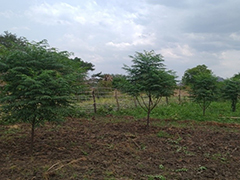
Mother Plant Garden in Rejaf East
As part of a technical study tour, PIU members visited Kenya Forestry Research Institute (KEFRI) in February 2020. The study tour aimed to strengthen the capacity of PIU members to implement project related activities. Project members were exposed to innovative agro-forestry practices in peri-urbann Kenya. Furthermore, PIU members and their counterparts from KEFRI engaged in knowledge sharing and a much deeper understanding of varying dynamics of climate change, desertification and forestry in the two neighboring countries. Moreover, PIU procured assorted forestry tree seeds from KEFRI, such as Melia volkasili and Accacia, and sourced several improved varieties of fruit tree seedlings, such as Tangerine, Grapefruit, Cashews and others for trial production from Uganda shortly after the KEFRI study tour.
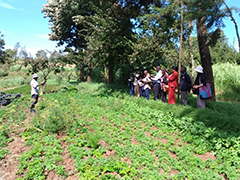
PIU members exposed to innovative agro-forestry techniques by Kenyan farmers as part of KEFRI technical study tour
Utilizing the depth and diversity of their expertise, the PIU facilitated an awareness creation and training session in February 2020. The aim was to emphasize the importance of agro-forestry as a pivotal mechanism for combating desertification and building resilient livelihoods in peri-urban localities. This included sessions introducing the participants to integrated farming systems, showcasing/displaying various methods of plant propagation, emphasizing the role of trees on landscapes, introducing methods of tree germination and highlighting various agro-forestry practices. Subsequently, PIU members facilitated distribution of seeds and seedlings to beneficiaries in Wau and Juba with guidance and technical assistance.
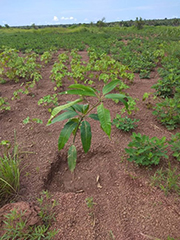
Grafted Mango seedlings integrated with crops in peri-urban Wau
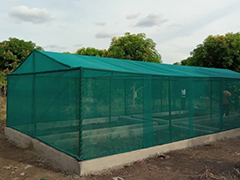
Community Seedling Nursery in Kapuri - a peri-urban locality around Juba
The follow-up scheme officially ended in March 2020. Notwithstanding, PIU members were actively engaged in maintaining project facilities such as the mother plant garden, overseeing operations of community nurseries and following up with project beneficiaries. In June 2021, the PIU facilitated a two-day country workshop to promote AI-CD activities, update stakeholders on recent AI-CD activities and to strengthen coordination and collaboration mechanisms to combat desertification. The PIU presented an overview of the pilot project focusing on the findings, lessons learned, challenges and action plan for future activities. Several concept notes for future follow-up programs were presented and discussed with stakeholders. This included 1) increasing household farm productivity through the introduction of improved crop varieties of superior genetic stocks, 2) improvement of livestock productivity and reduction of farmer/pastoralist conflicts through the semi-intensive livestock production and water conservation, and 3) improvement of shea nut processing capacity and marketing of high quality products. Furthermore, participants deliberated and exchanged ideas on enhancing capacities for resource mobilization and implementing AI-CD activities in South Sudan. One of the key resolutions of the workshop was to organize resource mobilization workshops to enhance coordination among the stakeholders and source much needed funding required to sustain and upscale project activities.
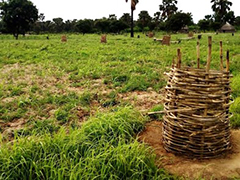
Application of integrated farming or Agro-forestry in peri-urban Wau. Protection of newly transplanted tree-seedlings from grazing ruminants by an enclosure made of locally available materials such as bamboo stems
Agro-forestry or integrated farming effectively tackles two of the most critical pervasive issues in South Sudan; food security and climate change. It is highly impactful in terms of building localized resilience to climate change while addressing critical nutritional bottlenecks at household level. As such, PIU plans to expand activities targeting more beneficiaries in peri-urban areas around Juba and Wau and eventually to newer locations across South Sudan. This entails the commitments of relevant line ministries at the national and state government in terms of financial and human resources. In order to fully capitalize from the multiple benefits of agro-forestry practices, JICA will continue to closely consult and work with the line ministries to combat desertification in South Sudan.
scroll